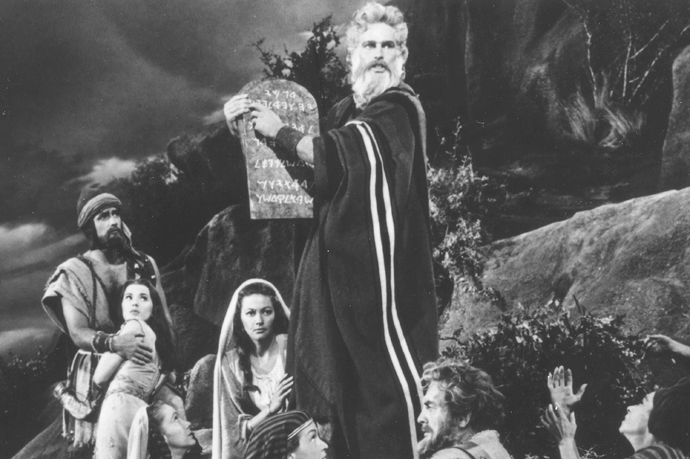Hollywood's real problem with religion
It isn't a dearth of religiously themed movies


A free daily email with the biggest news stories of the day – and the best features from TheWeek.com
You are now subscribed
Your newsletter sign-up was successful
Michael Cieply of The New York Times thinks Hollywood has a religion problem. In his time as a movie producer for Columbia Pictures, Cieply noticed that the major studios have an aversion to "tackling serious religious subjects."
It hasn't always been that way, he argues, listing The Ten Commandments (1956), Quo Vadis (1951), and A Man for All Seasons (1966) — all hits, all Oscar nominees for Best Picture — as examples of how an earlier era of moviemakers connected with religious audiences.
Now Noah, a big-budget, CGI-saturated dramatization of the Big Flood from the Book of Genesis, will test whether latter-day Hollywood can make that same connection. Based on what he's heard of negative test screenings of the film, Cieply concludes it isn't likely. And that's a sign, he thinks, that the major studios just don't get religion.
The Week
Escape your echo chamber. Get the facts behind the news, plus analysis from multiple perspectives.

Sign up for The Week's Free Newsletters
From our morning news briefing to a weekly Good News Newsletter, get the best of The Week delivered directly to your inbox.
From our morning news briefing to a weekly Good News Newsletter, get the best of The Week delivered directly to your inbox.
Cieply's article will no doubt provide aid and comfort to the religious right by confirming its suspicions about Hollywood's barely concealed contempt for faith. But those who care more about artistic quality than quantitative point-scoring will have a hard time getting worked up about Cieply's lament.
Yes, Hollywood produces relatively few films about religious subjects and themes. But that might not be a bad thing for religion.
Religion is a serious subject, and Hollywood doesn't do well with serious subjects — because Hollywood's goal is to make money, not art. If the major studios started producing more big-budget movies on religious topics, all we'd end up with are more dumbed-down portrayals of religion.
Don't believe me? Consider the record.
A free daily email with the biggest news stories of the day – and the best features from TheWeek.com
Of the three films Cieply lists from Hollywood's supposed golden age of religious filmmaking, one (A Man for All Seasons) is a good film about conscience and standing up to political authority, while the other two are schlocky Technicolor epics that narrate (and embellish) either a biblical story (The Ten Commandments) or an episode in the history of Christianity (Quo Vadis).

None of them treat religion seriously as a personal, spiritual, intellectual, or sociological phenomenon.
By all accounts, Noah fits the standard Hollywood approach precisely, using the latest advances in special effects to tell a well-known story from Scripture. Like nearly all such films — very much including Mel Gibson's independently produced and grotesquely ultraviolent The Passion of the Christ — it will likely reinforce the literalist prejudices of the least thoughtful strands of American religion, while failing to delve into deeper religious questions or themes.
So Cieply's greatest hits weren't that great — and if Hollywood followed his advice and sought to produce more big-budget religious films, the result would in all likelihood be similarly lame.
Which isn't to say quality religious films can't be made. They can be, and have been. But such films will never be blockbusters.
Here are some of the best religious films from recent decades. None of them were hits; all of them are enduring works of art.
- Based on Chaim Potok's acclaimed novel of the same name, The Chosen (1981) tells the story of two Jewish boys growing up in New York City during the 1940s — one the son of an ultra-orthodox rabbi, the other of a secular Zionist writer. The film does a marvelous job of using its four central characters to illuminate the clashes between different religious and political factions in the Jewish community of the time. I know of no more moving cinematic treatment of the lived reality of Judaism in modern America.
- Martin Scorsese's The Last Temptation of Christ (1988) is the rare film that combines a biblical narrative with the ambition to probe deeper questions and themes, in part by diverging from the letter of the scriptural text. The result is sometimes shocking, and often productively provocative. The film was a commercial flop and generated so much controversy that the major studios will be unlikely to green-light a comparably bold and creative film again.
- Shadowlands (1993) skirts but never veers fully into melodrama as it portrays Christian apologist C.S. Lewis's wrenching struggle to reconcile his faith with the suffering and death of his wife, Joy Gresham. It's a painful story beautifully acted by Anthony Hopkins and Debra Winger.
- Neil Jordan's The End of the Affair (1999) is the rare film that improves significantly on the book from which it was adapted. Jordan borrows liberally from what's best in Graham Greene's novel of adultery and religious conversion — the sparkling writing and intricate intermingling of multiple timelines — while purging almost entirely its greatest weakness: the preachy final act. The movie does a marvelous job of capturing the irreducible mystery of religious experience, while also giving us (in Ralph Fiennes' Maurice Bendrix) what may be the most interesting and psychologically astute portrayal of an atheist in film history.
- The greatest cinematic treatment of religion is also the most recent: Terrence Malick's The Tree of Life (2011). As I wrote in a column about the thematically similar but much less successful follow-up film To the Wonder (2012), The Tree of Life poses "sweeping theological questions — What is the meaning of suffering and loss? Why does God permit it? What kind of consolation can faith provide? — and answers them in the broadest possible terms. The film begins with one man's anguished efforts to come to terms with the death of his brother. From there it returns to the creation of the universe; gives us a glimpse of the origins of divine grace among the dinosaurs; explores the man's boyhood struggles with his father, mother, and ill-fated brother; and finally portrays the end of life on earth and a reconciliation of loved ones in heaven." The Tree of Life a truly great film. It will be admired and appreciated as long as human beings are serious about art and ponder the meaning of life, love, and existence.
If Hollywood followed Cieply's advice, we'd have plenty of action flicks about Old Testament battles and maybe some CGI-enabled dramatizations of the supernatural events recounted in the Books of Acts and Revelation. But there's no reason to think we'd have even one more End of the Affair or Tree of Life.
Hollywood doesn't have a religion problem. It has a quality problem.
Damon Linker is a senior correspondent at TheWeek.com. He is also a former contributing editor at The New Republic and the author of The Theocons and The Religious Test.
-
 5 thoroughly redacted cartoons about Pam Bondi protecting predators
5 thoroughly redacted cartoons about Pam Bondi protecting predatorsCartoons Artists take on the real victim, types of protection, and more
-
 Palestine Action and the trouble with defining terrorism
Palestine Action and the trouble with defining terrorismIn the Spotlight The issues with proscribing the group ‘became apparent as soon as the police began putting it into practice’
-
 Why is the Trump administration talking about ‘Western civilization’?
Why is the Trump administration talking about ‘Western civilization’?Talking Points Rubio says Europe, US bonded by religion and ancestry
